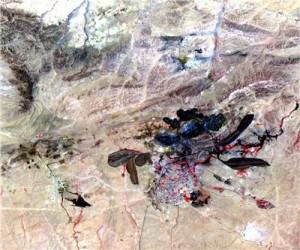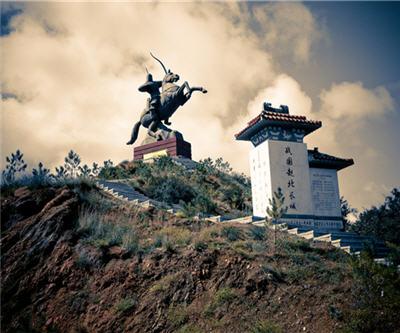This is a development all REE investors should look at very closely, and very carefully. The author quotes David Merriman (Roskill) who describes some kind of a stand off between downside pressure on REE pricing by FOB pricing brought in line with Chinese domestic pricing by lifting export taxes, and upside pressure by new tighter control of production and increasing costs. In the end illegal mining comes up as another factor in depressing REE pricing. I found it intriguing to see China stockpiling HREEs although prices went down further. My take on this is we haven't seen the bottom yet.
Link to the full article on Mining.com:
China's rare earth industry will look very different in 5 months
Frik Els |

The giant mine in Bayan Obo, Inner Mongolia near Baotou City, produces the bulk of the world's rare earths and does so as a byproduct of iron ore mining. | Source: NASA
As widely expected China's appeal to the World Trade Organization against an earlier ruling calling on the country to lift export quotas was rejected on Thursday.
China's Commerce Ministry responded on Friday saying it will strengthen regulations on resources in line with WTO rules.
China is responsible for roughly 90% of mined output of rare earths and is also the top user - the country's downstream industry consumes 70% of global production.
The easing of export restrictions as mandated by the WTO is not expected to have an influence on prices.
Exports since 2005 has not even come close to the export ceiling and over the past three years, quotas were more than 20,000 tonnes above actual exports.
What could have an impact is the removal of export taxes on rare earths products (tungsten and molybdenum are also subject to these taxes) which have been raised and widened on several occasions and are now levied at 15% - 20% by the country's General Administration of Customs.
Roskill Information Services says in a report scrapping these taxes could affect non-Chinese producers by potentially reducing FOB rare earth prices, and bring it in line with domestic Chinese prices.
The impact, at least in the short term, could be significant as domestic prices were on average 36% below reported FOB prices this year according to David Merriman, senior analyst at the London-based metals and minerals consultancy.
Even before the initial WTO ruling Beijing's strategy has been shifting from export to production control.
However, says Merriman, both FOB and Chinese domestic prices are expected to increase based on new tighter control of production and increasing costs.
Even before the initial WTO ruling Beijing's strategy has been shifting from export to production control.
Forced consolidation and vertical integration of the Chinese industry, a policy introduced by the equivalent of China's cabinet in January, should reduce competition and make output control easier.
On Friday, the merger and consolidation plans of three of the six national rare earth industry groups envisaged under the policy were approved by the Ministry of Industry and Information Technology.
The process should be complete before the end of the year.

Baotou City: Epicentre of China's rare earth industry
The six organizations are top producer Inner Mongolia Baotou Iron and Steel Group, China Minmetals Corporation, Aluminum Corporation of China (Chinalco), Guangdong Rare Earth Group, Xiamen Tungsten and Ganzhou Rare Earth Group with each grouping assimilating dozens of small miners, recyclers and processors.
The consolidation of the industry will further increase the prevalence of captive supply.
The consolidation of the industry will further increase the prevalence of captive supply
Purchasers of raw material that produce downstream rare earths products like powders and magnetic alloys are eligible for a 16% VAT rebate.
That's one of the reasons Chinese producers like Baotou and Chinalco have invested heavily in downstream facilities (thanks to its three Chinese plants, US-based Molycorp also happens to be one of the companies benefiting from the rebate).
"Increased captive supply since 2012 has resulted in a greater portion of rare earth raw materials and intermediate products not being made available even to the Chinese domestic market and thus reducing supply for other consumers," says Merriman.
On top of these measures China's State Bureau of Material Reserve has begun to stockpile rare earth oxides.
At the end of July the stocks stood at 10,090 tonnes which included 4,000 tonnes of praseodymium-neodymium oxide, 500 tonnes of praseodymium oxide, 500 tonnes of neodymium oxide, 1,200 tonnes of dysprosium oxide, 300 tonnes of erbium oxide, 500 tonnes of europium oxide, 500 tonnes of terbium oxide and 2,500 tonnes of yttrium oxide, reports InvestorIntel.
The Baotou Rare Earth Products Exchange launched in March should also encourage private sector stockpiling a la Fanya Metal Exchange.
The biggest threat to China's rare earth miners are not just low prices but smuggling, environmental devastation and dangerous artisinal mining practices which remain rampant.
Some estimates put exports from illegal mining through networks in Vietnam and Hong Kong as highs as 40,000 tonnes, matching China's now defunct annual quotas, further depressing prices.